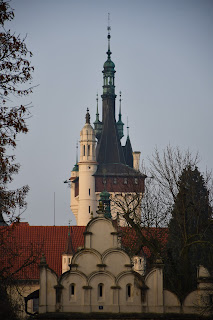Poland Trip: Day 3 – Gdańsk and Malbork Castle
My dad says I trust the weather forecast too much, and he may very well be right. Because it is supposed to rain tomorrow, I decided that I would try to see all the items on my list today. The weather was supposed to be sunny and indeed it was – perhaps too much so. Record temperatures are being reported from across Europe, and even as northern a town as Gdańsk started feeling uncomfortably steamy by ten o’clock.
I criss-crossed the
old town in the morning, walking west on Długa and back east on Chlebnicka. Długa
is the main street in Gdańsk, stretching between the Green Gate in the east and
the Golden Gate in the west. Between these two gates stands the Main Town Hall
with its slender redbrick tower, as well as Neptune’s Fountain. Even farther
west is the executioner’s tower (called the Katownia) and the High Gate, which
marks the boundary of the old town. Looping around to Chlebnicka, one walks
past the Great Armoury and eventually reaches the Basilica of Saint Mary.
With its double roofed
main tower and a host of shorter, spindly roofs made of copper, the Basilica is
one of the largest brick churches in the world. Nevertheless, its interior
seems rather austere in comparison to some of the places of worship I have seen
on this trip. The church is only a stone’s throw away from Saint Mary’s Gate,
and I imagine that so many buildings in the city carry Mary’s name because she
is the patron saint of the Knights Hospitaller, who left an indelible mark on Gdańsk.
I walked along the
bank of Spichrzów
Island for a few minutes, taking in the views of the houses on the opposite
side. Most impressive among them is the crane, a wooden building that dates to
the fifteenth century. The crane was used to transfer cargoes and install masts
on ships, which it was able to do thanks to its body leaning forwards over the
river. I then walked through the southern, more residential part of town to
take pictures of the Church of Saints Peter and Paul, as well as the National
Museum.
After I had eaten
breakfast – a bit of bread and cheese from a supermarket – I felt ready to
begin my last loop through the city. I walked back east along Długa one more
time and crossed the river onto Spichrzów
Island, crossing it as well. This time, I took in the views of the old town
from the town’s marina, which emerges just behind the tip of Spichrzów and
which leads to the island Ołowianka. As I found out, Ołowianka only connects to
the mainland by a bascule bridge, which alternates every half an hour between
its open and closed position.
As I reached the
bridge not long after it had opened for boats, I had to wait some time before I
could proceed to the churches on the other side. I originally intended to visit
the Basilica of Saint Bridget, but drawn in by the grandeur of Saint
Catherine’s Church, I had to retrace my steps to get there. Once again, Saint
Catherine’s interior was somewhat underwhelming, especially in contrast to
Saint Bridget’s, which has a very interesting and shiny deconstructed altar. No
wonder that of all the major churches in Gdańsk, it is Saint Bridget’s that
charges an entry fee.
I arrived at the main
train station a little before 11:20. I thought this might give me enough time
to catch the next train to Malbork, which was supposed to leave at 11:27, but
the ticket machine refused to give me a ticket. Annoyed, I had to wait in line
to buy my ticket from a ticket booth while the minutes slipped by. The lady was
only able to give me the ticket for the 12:02 train, which I thought rather
late until I somehow managed to miss that train as well by confusing the
platform number and the track number. The time 12:57 when the next train for
Malbork left seemed much later by comparison.
I arrived in Malbork
having eaten lunch and applied sunscreen at the main station in Gdańsk. I was
very glad I did both, as the ensuing tour of the castle would prove to be long
and occasionally exposed to the sharp sunlight. Despite my usual aversion to
audioguides, the one provided at Malbork was well-paced and informative. I
learned about the origins of the Knights Hospitaller as the order in charge of
the Christian hospital in Jerusalem during the Crusades. I also learned of the
order’s disputes with the Polish crown, which eventually led to the castle’s
sale to the Polish King following a long siege by Polish forces. Some websites
assert Malbork is the largest castle in the world, but its website only claims
it to be the largest brick castle.
When I returned to Gdańsk
late in the afternoon, my feet were killing me. Still mindful of the imminent
change in weather, however, I climbed the town hill to see Gdańsk in the light
of the setting sun. After I descended, I ate a proper dinner at a Georgian
restaurant and waddled off painfully to my hotel.



























































































Comments
Post a Comment